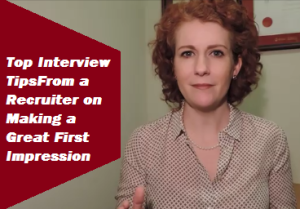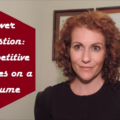What is an Elevator Pitch?
An elevator pitch is exactly what it sounds like. Imagine being in an elevator with a prospective employer and you only have the time it takes for the elevator to reach your floor to tell this person a bit about yourself. The elevator pitch is a short introduction that should briefly (i.e. roughly 30 seconds) describe your skills (who you are and what you do), your accomplishments (what value you can bring), and your goals (what type of role you are seeking).
A well-crafted elevator pitch is an essential tool when you are conducting your job search. Not only is it effective when introducing yourself to a network contact, but it also provides a basis for your answer to the “Tell me about yourself” interview question.
How to Craft an Elevator Pitch
There are 2 key elements to your elevator pitch: self-reflection and company research. The more important of the two is self-reflection, because who else knows your skills better than you! In your self-reflection, you will identify those top skills, accomplishments, and goals (including why this is a goal and who you will be helping with this goal) discussed earlier.
The second element, company research, is important for preparing your answer to the “Tell me about yourself” interview question. We will examine this later.
Pulling it all Together – Network Meeting
To help illustrate crafting an elevator pitch, I will use fictional character ‘Joe.’ He is a skilled tradesperson who has a vast amount of experience in custom home finishings. He has won awards and loves his job. Here is what ‘Joe’s’ elevator pitch might sound like:
Hi, my name is Joe. I am a highly skilled tradesperson, with expertise in carpentry. I have received several “Home Builder of the Month” awards for my outstanding craftsmanship in home finishings. My passion is for making a house a home by creating custom home finishings, and I am looking for a role in which I can work closely with home buyers in making their dream homes a reality!
Pulling it all Together – Job Interview
Much like the elevator pitch ‘Joe’ used before, we can simply add a ‘call to action’ at the end of the elevator pitch. Notice too that the introduction at the beginning will be removed as we must assume that in the interview, introductions would have already taken place.
The ‘call to action’ statement is your way to highlight how your skills, accomplishments, and goals align with the company’s short- and long-term goals. How would you know what the company’s goals might be? This is where your research comes in. By conducting a Google News search for recent news articles about the organization, along with the other research you have prepared for the interview, you should have a fair amount of knowledge as to any key developments within the organization. This could include things such as a major investment or company expansion. Using our previous example, Joe’s ‘call to action’ statement might be something like this:
I understand that your company is investing in custom build homes for 3 new developments in the city. I believe my talents in carpentry and passion for engaging customers with my personalized designs would be a benefit to your organization.
Final Thoughts
The elevator pitch is a great tool not only for your job search activities but also for networking within your current organization. That said, crafting one is not always easy as it requires a great deal of self-reflection. The only person who really knows about all of the great things that you do is you. So to enable you to articulate all of your wonderful skills and achievements, self-reflection is an important exercise.
If you would like personalized advice, please feel free to view my services here. If you have any questions, you can leave a comment below, or send me an email – I’d love to hear from you.















